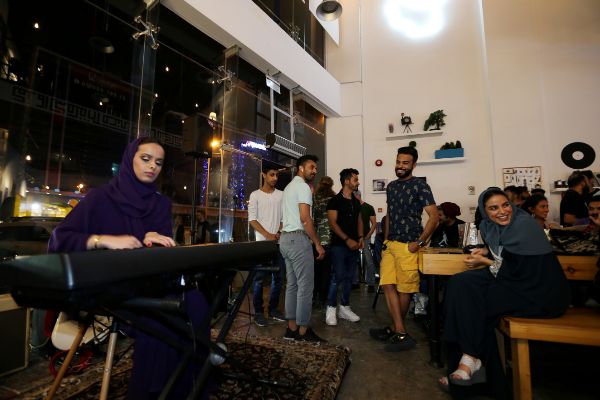- Near East. Saudi Arabia will exhibit during the G20 summit "the achievements of its 2030 Vision"
- Near East: Saudi Arabia frees a dozen dissidents in full campaign to clear their international image
In Saudi Arabia, restaurants had to have two different entrances and internal spaces for families and women , on the one hand, and for men, on the other. A measure derived from the strict segregation by sex that this Sunday a ministerial statement has eliminated, in the nth resolution of a regime that aspires to open up.
"The requirement that restaurants and kitchens have two accesses, one for families and one for singles, " the Saudi Ministry of Municipalities and Rural Affairs has decreed in a note disclosed in its Twitter account. The historic suspension appears crouched between technicalities and a dozen measures aimed at managing schools, hospitals and other public establishments " to attract investments and create new business opportunities ."
The resolution supposes, in practice, to mitigate the rigorous segregation by genres that until now dominated the public scene in the ultraconservative realm and that in the last months has been fading away from shopping centers, coffee shops, function halls and concerts.
The end of the obligation to establish differentiated doors also affects, as indicated in the note, the internal distribution of restaurants, where until now there were areas for men and family. According to the document, establishments are not required to " establish private spaces ." To date, in small restaurants without segregation space, the entry of females was not allowed.
When strolling through Riyadh, the Saudi capital, the relaxation of this segregation for decades prevented men and women from sharing public space is one of the most visible effects of the openness advocated by Crown Prince Mohamed bin Salman. Along these lines, three years ago, the authorities reduced the powers of the moral police in charge of protecting "virtue" and "preventing vice" and that, until then, had watched sex segregation without contemplation.
The decision, which is not mandatory, now leaves the disposal or maintenance of access and internal areas to the owners of the premises. The separation by sex will remain in force in other public facilities such as hospitals, schools and universities.
In recent years, the kingdom has eliminated the ban that prevented women from driving; He has opted for female entertainment and employment, based on the urgent need to diversify his economy. " Welcome to the new Saudi Arabia, " a Saudi ambassador proclaimed earlier this week at an international summit in Riyadh, explaining the "new philosophy" that moves the country.
In his public speeches, Crown Prince Mohamed bin Salman has insisted on his intention that the ultraconservative kingdom, cradle of the most intolerant Islam, "return to moderate Islam . " The son of the current monarch blames conservatism on the events experienced in 1979 with the Islamic revolution in Iran and the assault and the capture of the Great Mosque of Mecca by a group of Islamists led by Yuhaiman al Otaibi in protest of "Westernization" of Saudi society.
Reserved Areas
The reversal of these measures has been the main beneficiary of the female population, who two years ago was able to attend sports events in areas reserved for families in the stadiums for the first time. Girls' access to physical education and the opening of exclusive gyms for women are also recent measures.
The sudden openness, however, is marked by contradictions. The measures have received different reception in urban and rural areas and have caused the reluctance of the most orthodox sectors . Last September the kingdom passed a new law of "public decency" that punishes the attack against modesty, public displays of affection or graffiti. A rule criticized by activists and opponents that tries to satisfy the most recalcitrant sectors. The authorities also maintain the system of male guardianship over women.
The reforms - including in Saudi Vision 2030, a strategy to "end the addiction to oil" of the kingdom - have been dull and even questioned by the actions that Bin Salman has led since his arrival at the Ministry of Defense and his jump to the first line of succession: the warlike adventure in neighboring Yemen, the largest humanitarian crisis on the planet; internal persecution against activists and dissidents; and the murder of journalist Jamal Khashoggi at the Saudi consulate in Istanbul a year ago.
According to the criteria of The Trust Project
Know more- Saudi Arabia
- Jamal Khashoggi
Middle East Saudi Arabia frees a dozen dissidents in full campaign to clear their international image
Middle East Saudi Arabia runs a new campaign of arrests against activists and intellectuals
Protests Several hundred CDRs cut back access to Barcelona

